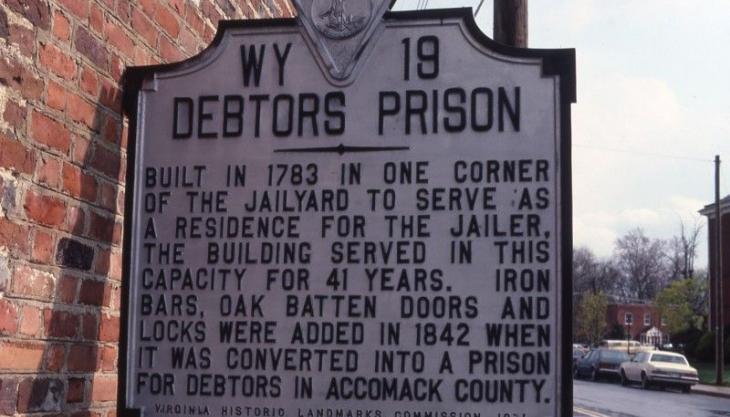Debtors' Prison Costing North Carolina Taxpayers and Punishing the Public
Submitted by Rachel R on Tue, 12/31/2013 - 5:44pm

Debtors' prisons were common in America until Federal law prohibited them, but the practice continues today
Image source: SOTT.net
Jails are intended for criminals but increasingly what’s deemed “criminal” and those that are put behind bars is highly questionable. Did you know you can be put behind bars for civil issues that involve money? Those that are imprisoned for money owed are remanded to what can aptly be called “debtors' prison” and this is a practice that is unfortunately alive and well in North Carolina today.
What Is a Debtors' Prison?
Historically, debtors' prison was an institution to punish by incarceration those who couldn’t pay what they owed. They were established as far back as there have been forms of currency and debt. In modern times, they have been disbanded as inhumane and are no longer practiced in most parts of the world. Shamefully, though, the United States is one of just a few places including Hong Kong and Greece where the practice still persists although they don’t formally call it “debtors' prison.” No matter what you want to call it, putting people behind bars for debt is horrific.
What Is a Modern Day Debtors' Prison?
Although there are federal laws against imprisoning people for their inability to pay fines owed – whether incurred from a civil or a criminal court – many states still persist with this practice and North Carolina is one of these. Debtors' prisons were abolished by law in the 1830s, but this has not stopped many states from putting people behind bars for debts. And what’s worse is that it costs far more to imprison people than their debts total and that money is coming from taxpayer pockets. It also gives otherwise decent people a criminal record which can prevent them from earning a living wage in the future which perpetuates the debt cycle.
North Carolina is putting the state's poor into debtors' prison
Image source: PhiloForChange.org
How Does North Carolina Punish the Impoverished?
In addition to fines and fees that can occur as a result of failing to appear for civil court hearings, criminal matters – even relatively minor ones like DUI or shoplifting - can result in huge court fines. Miranda Rights say that if you can’t afford an attorney, one will be provided to you. But in North Carolina, public defenders come at a cost to even the poorest of defendants. If you plead guilty (which is common with a plea bargain to avoid jail) or are found guilty, you have to pay for your court-appointed attorney. Conceivably you can be jailed for your crime, serve your time and then be thrown back in jail for failing to pay for your attorney (and how could you earn money to pay your public defender while you were in jail?)
What’s the Answer?
Rather than putting poor people behind bars over debt, North Carolina courts should look at ability to pay. For those that have the ability pay but simple aren’t paying, garnishing wages or bank accounts makes sense rather than tossing people in jail which costs the rest of the taxpayers money. And for those that truly can’t afford to pay, there should be an evaluation and if there is no ability to pay, the debt should be discharged or postponed. Monthly installment payments should not be set by the amount owed divided by x number of months, but could be based on a percent of disposable income (5-10%) and however long it takes to pay back is how long it takes without tacking on interest, collection costs and other fees which digs people deeper into debt.
If you are dealing with debts you can’t pay and are facing any sort of lawsuit or court hearing, filing bankruptcy will eradicate most of what you owe. While criminal fines and traffic tickets aren’t dischargeable, other court related costs may be. And filing bankruptcy may convince the judge in your criminal or civil case to cut you a break on fines. To find out how bankruptcy can help you avoid North Carolina debtors' prison, contact the law offices of John T Orcutt for a free consultation.
Debts Hurt! Got debt? Need help? Get started below!
Serving All of North Carolina
- Bankruptcy Attorneys Raleigh NC (North)
- Bankruptcy Attorney Fayetteville NC
- Bankruptcy Attorney Durham NC
- Bankruptcy Attorneys Wilson NC
- Bankruptcy Attorneys Greensboro NC
- Bankruptcy Attorneys Southport NC
- Bankruptcy Attorneys Wilmington NC
Bankruptcy Attorneys Raleigh NC (North)
6616 Six Forks Rd #203 Raleigh, NC 27615 North Carolina
Tel: (919) 847-9750

Bankruptcy Attorney Fayetteville NC
2711 Breezewood Ave Fayetteville, NC 28303 North Carolina
Tel: (910) 323-2972

Bankruptcy Attorney Durham NC
1738 Hillandale Rd Suite D Durham, NC 27705 North Carolina
Tel: (919) 286-1695


Bankruptcy Attorneys Greensboro NC
2100 W Cornwallis Dr. STE O Greensboro, NC 27408 North Carolina
Tel: (336) 542-5993

Bankruptcy Attorneys Southport NC
116 N Howe St. Suite A Southport, NC 28461 North Carolina
Tel: (910) 218-8682

Bankruptcy Attorneys Wilmington NC
116 N. Howe Street, Suite A Southport, NC 28461 North Carolina
Tel: (910) 447-2987
